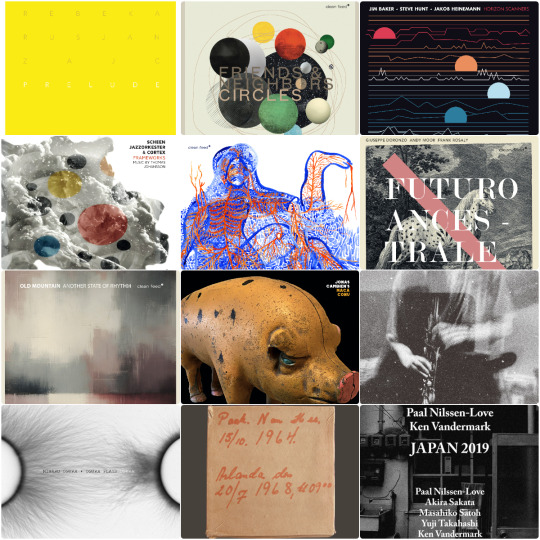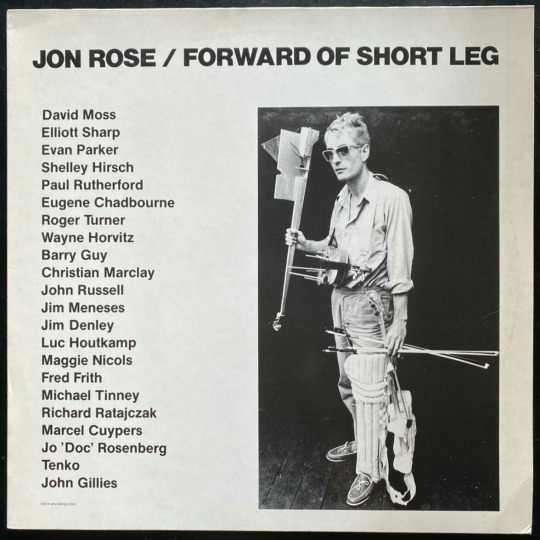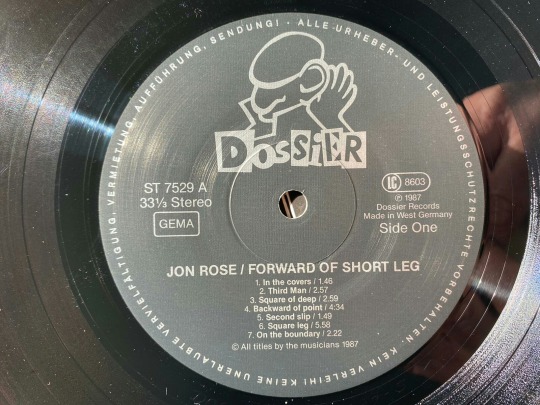#Elliott Sharp
Text
03.24.24 Elliott Sharp's Void Patrol (with guests Cyro Batista and Colin Stetson) at Big Ears Festival
7 notes
·
View notes
Text




Eugene CHADBOURNE
"Country Music in the World of Islam vol.15"
(tp.LP. Fundamental. 1989) [US]
youtube
#eugene chadbourne#1989#usa#freaks#diy#free rock#anti folk#political#art rock#sun city girls#elliott sharp#records#Youtube
7 notes
·
View notes
Video
youtube
Elliott Sharp + Debbie Harry, Spectropia Suite.VII. This Time That Place I Spectropia, 2013
https://en.wikipedia.org/wiki/Elliott_Sharp
https://en.wikipedia.org/wiki/Debbie_Harry
2 notes
·
View notes
Text
1 note
·
View note
Text
Co w jazzie piszczy [sezon 2 odcinek 7]
premierowa emisja 21 lutego 2024 – 18:00
Graliśmy:
Rebeka Rusjan Zajc “Illusion” [fragm.]z albumu “Prelude” – Clean Feed Records
Friends & Neighbors “Cecil” z albumu “Circles”– Clean Feed Records
Jim Baker/Steve Hunt/Jakob Heinemann “Mozart” z albumu “Horizon Scanners”– Clean Feed Records
Scheen Jazzorkester & Cortex “Weaving” z albumu “Frameworks – Music by Thomas Johansson” – Clean Feed…

View On WordPress
#Andy Moor#Clean Feed Records#Co w jazzie piszczy#Cortex#DL Room#Elliott Sharp#fönstret#Frank Rosaly#Friends & Neighbors#Giuseppe Doronzo#Jakob Heinemann#Jim Baker#Joana Sá#João Sousa#Jonas Cambien#Ken Vandermark#Lisa Ullen#Lol Coxhill#Masahiko Satoh#Miharu Ogura#Mike Cooper#Old Mountain#Paal Nilssen-Love#Pedro Branco#PNL Records#Rebeka Rusjan Zajc#Scheen Jazzorkester#Steve Hunt#Thanatosis Produktion#Thomas Johansson
0 notes
Text
It was 35 years ago today: Wayne Horvitz's sextet The President's Bring Yr Camera was released. The album features Horvitz on keyboards, harmonica, and drum programming; Bobby Previte on drums; Elliott Sharp on guitars; Dave Hofstra on electric bass and tuba; Doug Wieselman on tenor sax; and Dave Tronzo on slide and national steel guitars. You can hear it here.
Waye Horvitz performs at Big Ears Festival in March.
#wayne horvitz#bring yr camera#bobby previte#elliott sharp#dave hofstra#doug wieselman#dave tronzo#nonesuch#nonesuch records
0 notes
Text
youtube
A proposito di Gigi Riva, eccovi un brano dei NAD del 1989 (in versione remaster 2016 per Kutmusic) insieme a Denardo Coleman · Elliott Sharp · Sonny Sharrock.
0 notes
Text
Elliott Sharp, "Chernozem"
#NowPlaying
0 notes
Video
12.20.22 Andrew Cyrille, Elliott Sharp, James Ilgenfritz and Alvin Curran perform at the memorial for Richard Teitelbaum at Roulette NYC
#Andrew Cyrille#Elliott Sharp#James Ilgenfritz#Alvin Curran#Richard Teitelbaum#Roulette NYC#experimental music
9 notes
·
View notes
Text
youtube
1 note
·
View note
Text




Jon ROSE
"Forward of short Leg"
(LP. Dossier. 1987 / rec. 1980-86) [AU]
youtube
#jon rose#1980#australia#slawterhaus band#jazz#free jazz#improvisation#freaks#free rock#relative band#maggie nichols#jim denley#roger turner#paul rutherford#elliott sharp#wayne horwitz#david moss#evan parker#barry guy#john russell#eugene chadbourne#fred frith#tenko#christian marclay#shelley hirsch#dense band#records#Youtube
3 notes
·
View notes
Text
Tim Brady’s Canadian Classical Invasion
Starkland ST-237
This is Tim Brady’s fourth Starkland release, a distinction shared by only two other composers, the late Tod Dockstader and (the delightfully very much living) Guy Klucevsek. And given the impressive track record of the Starkland label’s ability to find and promote innovative composers and performers who later achieve much wider recognition, this is an event that demands serious…

View On WordPress
#Chamber music#Charles Valentine Alkan#Classical Music#Composers#contemporary music#electric guitar#Elliott Sharp#George Harrison#Glenn Branca#Guitar#Guy Klucevsek#John Klepko#Kaikhosru Shapurji Sorabji#Les Paul#looping#Modern Music#Morris Apelbaum#Music#New Music#punk#Rhys Chatham#Starkland Records#Steve Reich#Symphony#Tim Brady#Tod Dockstader#Tom Steenland
0 notes
Video
youtube
Debbie Harry / Elliott Sharp , Spectropia Suite: XIII. Sally Random I Vol. 6 Spectropia Suite, 2013
0 notes
Text
Void Patrol: Composing with Pencil, Paper, and Sound

From left to right: Colin Stetson, Billy Martin, Elliott Sharp & Payton MacDonald; Photo by Reuben Radding
BY JORDAN MAINZER
Keyboardist, percussionist, and composer Payton MacDonald considers himself an outlier when it comes to his pandemic experience. Though, like everyone else, he missed playing for crowds and with other instrumentalists in person, he was finally able to work with his dream team and make Void Patrol (Infrequent Seams), a jazz-metal hybrid that explores an interplay between groove and drone.
MacDonald had long envisioned summoning a quartet of saxophonist Colin Stetson, percussionist Billy Martin, and guitarist Elliott Sharp, in some form or other. (MacDonald had previously played in school with Stetson, but never with the others.) With some timely pre-pandemic grant money coming into fruition, MacDonald reached out to the other three with, yes, the promise of a little money, but an idea. He proposed laying down the marimba backbone of six tracks--“a very elemental, repetitive drone structure,” MacDonald told me over the phone earlier this summer--and then making charts based on a factorial operation such that each member would add on, but in a different order each time. All were free, and all agreed.
Nobody knew ahead of time what the music would sound like. “We talked only a little bit about aesthetics before we started going,” MacDonald said. “I suggested we use drones; the others were very agreeable to that. Colin gravitates towards repetitive structures and minimalism, which you can hear in his solo work. And Elliott is equally passionate about various kinds of world music.” Once they decided on a submission order and everyone sent MacDonald their pieces, he added marimba on his own and took away some of the music he had initially recorded. Over various emails and Zoom and phone calls, the four hashed out what would become Void Patrol.
MacDonald doesn’t take for granted that Void Patrol was a success, especially considering he had never made music virtually with a quartet before. He had collaborated with Portuguese marimba player Pedro Carneiro using a real-time software called SonoBus on an album that was released last year. And as a composer in the pop and film world, he had sent and received tracks to and from collaborators over email. But building up a piece with this many other improvisers without being in the same room them was new territory. “I wasn’t sure it would work or if it would sound organic, but I was just so blown away,” he said. “If I hadn’t told anyone what we did, I think people would think we were in the studio.” Admittedly, knowing the context of the album, the first time I listened to Void Patrol, I did so actively, trying my hardest to pick apart where it most sounded like a virtual collaboration. I certainly couldn’t find it in opener “Antares”, which starts with a steady drum beat that quickly goes off-kilter, eventually coupled with queasy electronics. After a groove settles in, Stetson’s unmistakable sax trills enter, like he was visually cued in. Sure, moments on “Rigel” or “Sirius” come out of nowhere--convulsing electronics following clattering percussion, or guitars suddenly becoming tangled--but Void Patrol builds and quiets naturally.

Album art by Billy Martin
The night before I spoke with MacDonald, the four had played together live for the first time, at The Sultan Room in Brooklyn. Stetson brought his alto, tenor, and bass saxophones. MacDonald played marimba and vibraphone. Martin brought “a suitcase full of percussion instruments,” including the talking drum used on Void Patrol. Sharp brought an 8-string guitar with a range of guitar and bass, as well as his pedal board. While MacDonald had written some charts for the four to follow, and the band started with “Antares”, they quickly did their own thing. “At first, it started out according to plan. Elliot brought in that introduction, and then I brought in that chord progression outlined on the marimba. It was fairly close to what you hear on the record,” MacDonald said. “But somewhere around 4 or 5 minutes in, we never looked back.” They played for 55 minutes, as one piece. Yet, there were times when they returned to some of the moments on the album, like with the talking drum, or on the deep textures of closer “Acrux”. “It was like we were free associating with the material we already worked with, in a very non-limiting way,” MacDonald said.
Hearing MacDonald talk about playing Void Patrol live and comparing it to how the album was constructed made me wonder, and ultimately ask him, a question that’s perhaps impossible to answer: Could the four have arrived where they did had Void Patrol been made in person? “Probably,” MacDonald guesses, but with a caveat: “With open-ended playing situations, I’m not always happy about every situation I make. When we’re tracking [in the studio], I had time to try things, and when something wasn’t working, I could go back. It’s like composing with pencil and paper, but doing it directly with sound.”
What’s best is that the quartet is just getting started. First of all, they recorded their first concert in hopes they could use their material for another album. Generally speaking, their harmony is palpable. “We all have wide appetites for music,” MacDonald said. “Our conversation ranged from Anthony Braxton to Xenakis to the Pet Shop Boys. It enables us to communicate in ways musically on stage that tend to work. We’re also all four of us quite dedicated to our instruments and have a level of proficiency on the instrument itself.” And all four have wide imaginations, a penchant for exploring the unknown, suggested by the album title itself and exemplified by the music. That quality should sustain this quartet no matter how they make music.
youtube
#interviews#elliott sharp#payton macdonald#the sultan room#void patrol#colin stetson#billy martin#reuben radding#infrequent seams#pedro carneiro#sonobus#anthony braxton#iannis xenakis#pet shop boys
0 notes